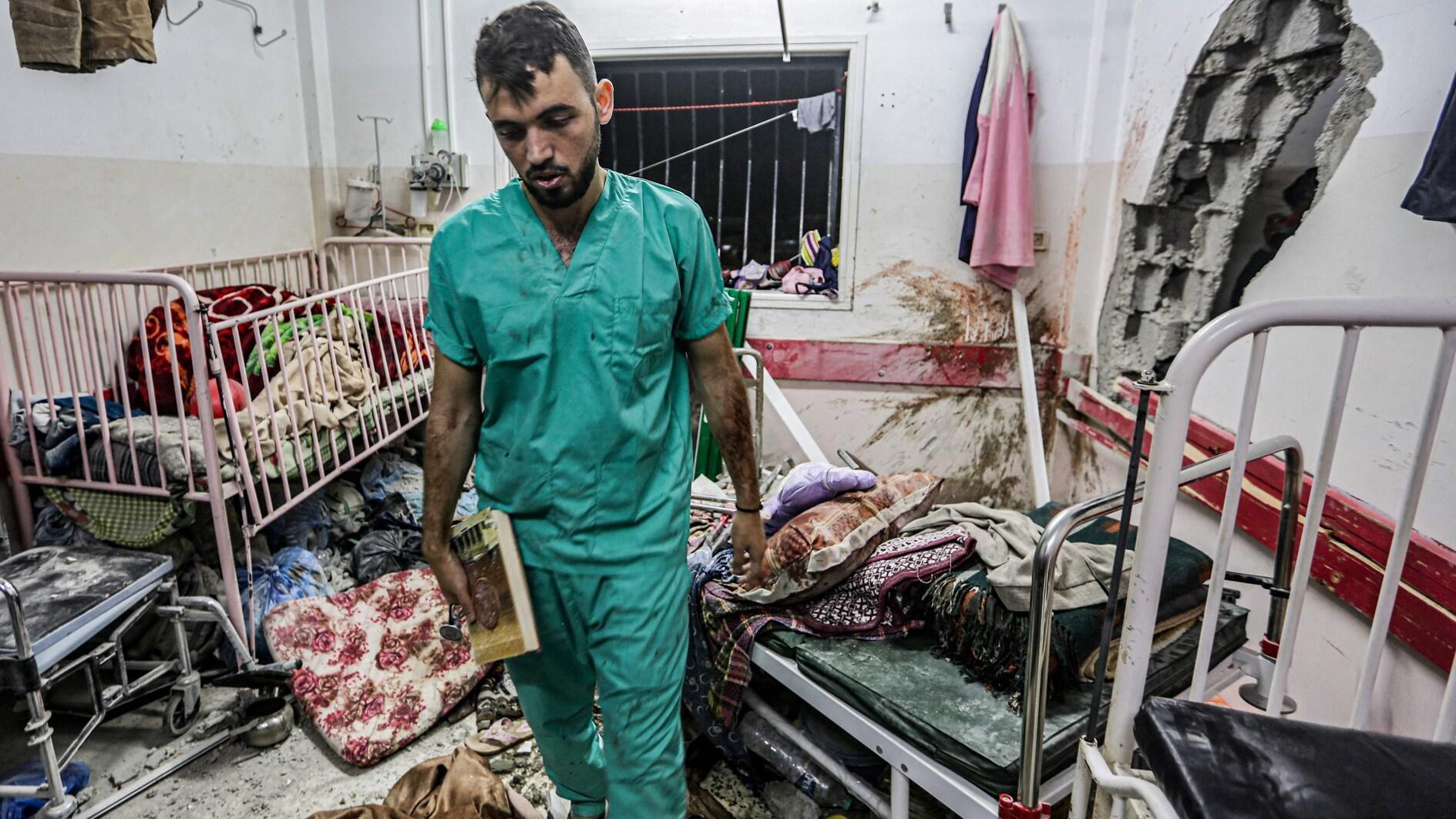
Fears mounted Saturday for people trapped in one of Gaza's main hospitals after Israeli troops raided the facility and the Hamas-run territory's health ministry said several patients had died there from a lack of oxygen.
The ministry said late Friday that at least 120 patients and five medical teams were stuck without water, food and electricity in the Nasser Hospital in Gaza's main southern city of Khan Yunis.
In recent days, intense fighting has raged around the hospital — one of the Palestinian territory's last remaining major medical facilities that remains operational.
Troops entered the hospital on Thursday, acting on what the military said was "credible intelligence" that hostages seized in Hamas' unprecedented Oct. 7 attack had been held there and that the bodies of some may still be inside.
The army said it had arrested 20 people, seized weapons and retrieved "medications with the names of Israeli hostages" in the hospital.
A witness, who declined to be named for safety reasons, told AFP the Israeli forces had shot "at anyone who moved inside the hospital".
Gaza's health ministry also said power was cut off and the generators had stopped after the raid, leading to the deaths of five patients.
It said it held Israel "responsible... considering that the complex is now under its full control".
The Israeli army insisted it had made every effort to keep the hospital supplied with power. "Troops worked to repair the generator while... special forces brought in an alternative generator," it said.
But the World Health Organization on Friday slammed the Israeli operation, with spokesperson Tarik Jasarevic telling reporters that "more degradation to the hospital means more lives being lost".
"Patients, health workers, and civilians who are seeking refuge in hospitals deserve safety and not a burial in those places of healing."
'Pattern of attacks'
Doctors Without Borders said its medics had been forced to flee and leave patients behind, with one employee unaccounted for and another detained by Israeli forces.
Dozens of the estimated 250 hostages seized during the attack were freed in exchange for Palestinian prisoners during a week-long truce in November. Israel says 30 of those still in Gaza are presumed dead.
At least 28,775 people, mostly women and children, have been killed in Israel's subsequent assault on Gaza, according to the health ministry in the Hamas-run territory.
Israel has repeatedly accused Hamas militants of using hospitals for military purposes, which Hamas has denied.
The U.N. Human Rights Office said Israel's raid on the Nasser Hospital appeared to be "part of a pattern of attacks by Israeli forces striking essential life-saving civilian infrastructure in Gaza, especially hospitals".
'Dying slowly'
Around 1.4 million displaced civilians are trapped in the town of Rafah, after taking refuge in a makeshift encampment hard by the Egyptian border with dwindling supplies.
"They are killing us slowly," said displaced Palestinian Mohammad Yaghi.
"We are dying slowly due to the scarcity of resources and the lack of medications and treatments."
U.S. President Joe Biden urged Israeli Prime Minister Benjamin Netanyahu late Thursday not to carry out an offensive on Rafah without a plan to keep civilians safe, the White House said.
But Netanyahu has insisted he will push ahead with a "powerful" operation in Rafah to achieve "complete victory" over Hamas.
Foreign Minister Israel Katz said Friday that Israel would coordinate with Egypt before launching its operation.
"Egypt is our ally, we have peace agreements with Egypt and we will operate in a way that does not hurt the Egyptian interests," Katz told reporters in Munich.
Biden said he had also held "extensive" conversations with Netanyahu about the need for a new truce in Gaza to bring the remaining hostages home.
"I feel very strongly about it — that there has to be a temporary ceasefire to get the prisoners out, to get the hostages out," he said.
Hamas's armed wing said that hostages in Gaza were "struggling to stay alive" as conditions deteriorate due to relentless Israeli bombardments.
The Wall Street Journal reported Thursday that Egypt was building a walled camp near the border to accommodate any Palestinians displaced from Gaza, citing Egyptian officials and security analysts.
Egypt has repeatedly opposed any "forced displacement" from Gaza, warning it could jeopardise its 1979 peace treaty with Israel.
U.N. High Commissioner for Refugees Filippo Grandi said any mass exodus of refugees would be "catastrophic" for both Egypt and the Palestinians.
"More important than anything else, a further refugee crisis would be almost the nail in the coffin of a future peace process," Grandi told the BBC.
Israel shooting
In the southern Israeli town of Kiryat Malakhi, about 25 kilometers (15 miles) north of Gaza, a gunman killed two people at a crowded bus stop on Friday and wounded four others.
Netanyahu warned that the entire country had become a front line, saying that "the murderers, who come not only from Gaza, want to kill us all".
With the war now in its fifth month, tensions remain high across the region.
Hamas ally Hezbollah and its arch-foe Israel have been exchanging near-daily fire across the border since the Israel-Hamas war broke out on Oct. 7.
The leader of the Iran-backed Hezbollah movement, Hassan Nasrallah, vowed that Israel would pay "with blood" for civilians it has killed in Lebanon, warning his group had missiles that can reach anywhere in Israel.